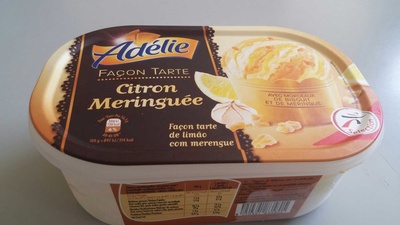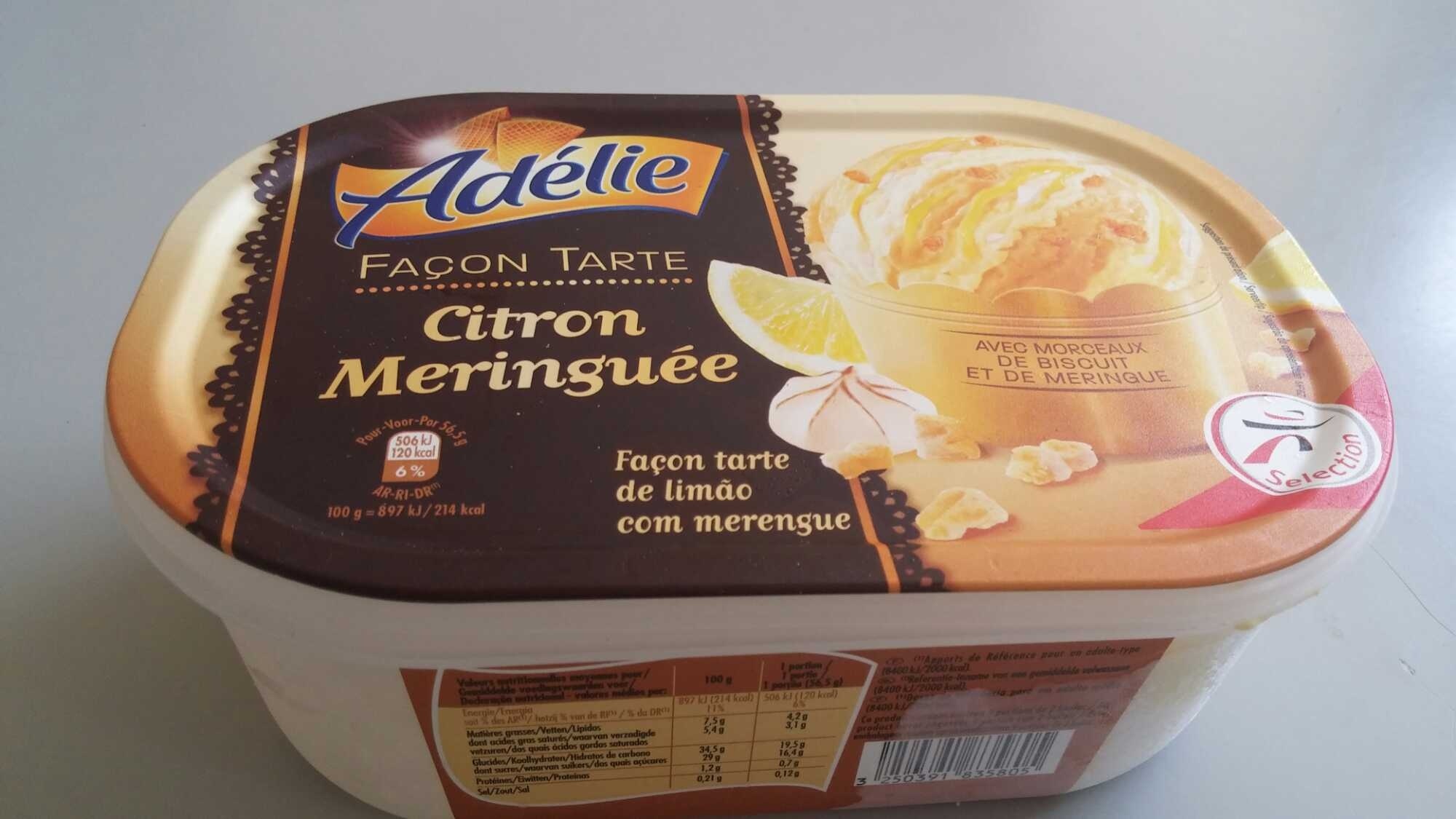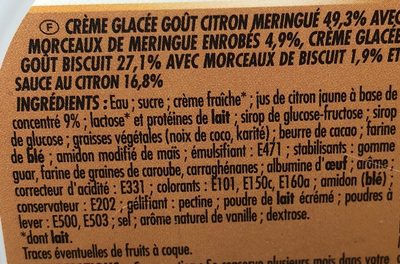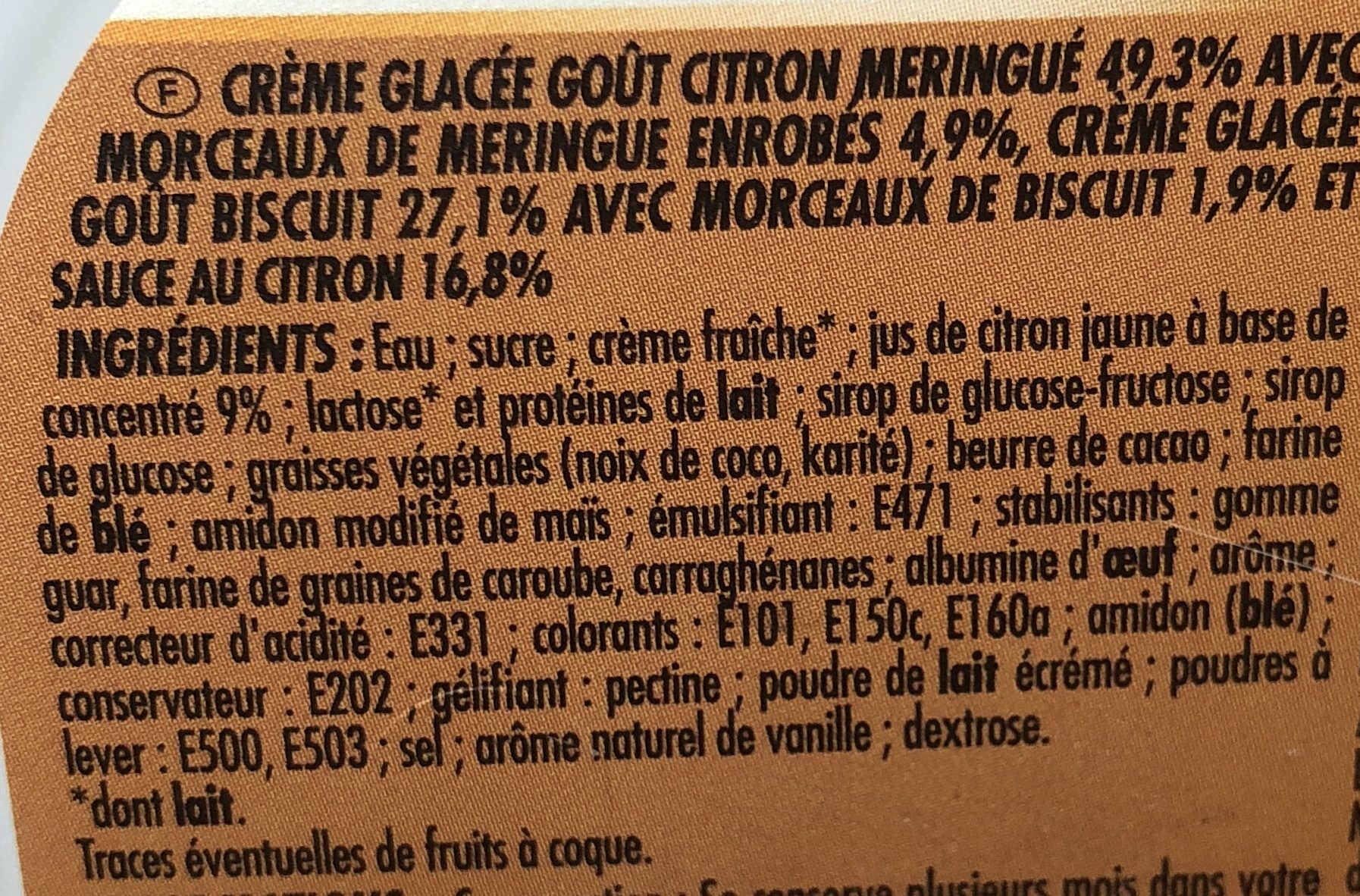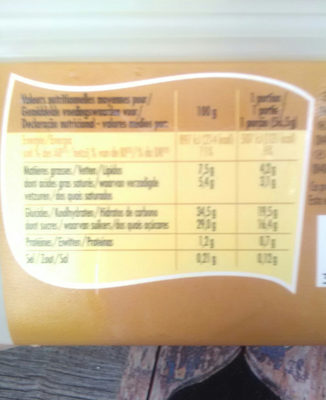Help us make food transparency the norm!
As a non-profit organization, we depend on your donations to continue informing consumers around the world about what they eat.
The food revolution starts with you!
Bac façon Tarte citron meringuée - Adélie - 509 g
Bac façon Tarte citron meringuée - Adélie - 509 g
This product page is not complete. You can help to complete it by editing it and adding more data from the photos we have, or by taking more photos using the app for Android or iPhone/iPad. Thank you!
×
Some of the data for this product has been provided directly by the manufacturer .
Barcode: 3250391835805 (EAN / EAN-13)
Quantity: 509 g
Packaging: Cardboard, Frozen, fr:Bac glacé
Brands: Adélie
Categories: Desserts, Frozen foods, Frozen desserts, Ice creams and sorbets, Ice creams, Ice cream tubs
Labels, certifications, awards: Made in France
Manufacturing or processing places: France
Traceability code: EMB 35360C - Vitré (Ille-et-Vilaine, France)
Stores: Intermarché
Countries where sold: France
Matching with your preferences
Health
Ingredients
-
40 ingredients
: Eau ; sucre ; crème** fraîche 19% ; jus de citron à base de concentré 5.8% ; lactose** et protéines de lait ; jus de citron 4.3% ; sirop de glucose - fructose ; sirop de glucose ; beurre de cacao ; graisses végétales (noix de coco, karité) ; amidon transformé ; farine de blé ; albumine d' œufs ; émulsifiant : mono - et diglycérides d'acides gras (origine végétale) ; stabilisants : farine de graines de caroube, gomme guar, carraghénanes ; correcteur d'acidité : citrate de sodium ; gélifiant : pectine ; amidon de blé ; colorants : riboflavines, caramel ammoniacal, caroténoïdes ; arôme ; arôme naturel ; lait écrémé en poudre ; poudres à lever : carbonates de sodium, carbonate d'ammonium ; conservateur : sorbate de potassium ; sel ; arôme naturel de vanille. **Dont _lait.Allergens: Eggs, Gluten, Milk, Nuts, Soybeans, Sulphur dioxide and sulphites, fr:citronTraces: Nuts, fr:soja-certains-ingredients-ne-sont-pas-francais
Food processing
-
Ultra processed foods
Elements that indicate the product is in the 4 - Ultra processed food and drink products group:
- Additive: E101 - Riboflavin
- Additive: E14XX - Modified Starch
- Additive: E150c - Ammonia caramel
- Additive: E160 - Carotenoids
- Additive: E407 - Carrageenan
- Additive: E412 - Guar gum
- Additive: E440 - Pectins
- Additive: E471 - Mono- and diglycerides of fatty acids
- Ingredient: Colour
- Ingredient: Emulsifier
- Ingredient: Flavouring
- Ingredient: Gelling agent
- Ingredient: Glucose
- Ingredient: Glucose syrup
- Ingredient: Lactose
- Ingredient: Milk proteins
Food products are classified into 4 groups according to their degree of processing:
- Unprocessed or minimally processed foods
- Processed culinary ingredients
- Processed foods
- Ultra processed foods
The determination of the group is based on the category of the product and on the ingredients it contains.
Additives
-
E101 - Riboflavin
Riboflavin: Riboflavin, also known as vitamin B2, is a vitamin found in food and used as a dietary supplement. Food sources include eggs, green vegetables, milk and other dairy product, meat, mushrooms, and almonds. Some countries require its addition to grains. As a supplement it is used to prevent and treat riboflavin deficiency and prevent migraines. It may be given by mouth or injection.It is nearly always well tolerated. Normal doses are safe during pregnancy. Riboflavin is in the vitamin B group. It is required by the body for cellular respiration.Riboflavin was discovered in 1920, isolated in 1933, and first made in 1935. It is on the World Health Organization's List of Essential Medicines, the most effective and safe medicines needed in a health system. Riboflavin is available as a generic medication and over the counter. In the United States a month of supplements costs less than 25 USD.Source: Wikipedia
-
E101i - Riboflavin
Riboflavin: Riboflavin, also known as vitamin B2, is a vitamin found in food and used as a dietary supplement. Food sources include eggs, green vegetables, milk and other dairy product, meat, mushrooms, and almonds. Some countries require its addition to grains. As a supplement it is used to prevent and treat riboflavin deficiency and prevent migraines. It may be given by mouth or injection.It is nearly always well tolerated. Normal doses are safe during pregnancy. Riboflavin is in the vitamin B group. It is required by the body for cellular respiration.Riboflavin was discovered in 1920, isolated in 1933, and first made in 1935. It is on the World Health Organization's List of Essential Medicines, the most effective and safe medicines needed in a health system. Riboflavin is available as a generic medication and over the counter. In the United States a month of supplements costs less than 25 USD.Source: Wikipedia
-
E202 - Potassium sorbate
Potassium sorbate (E202) is a synthetic food preservative commonly used to extend the shelf life of various food products.
It works by inhibiting the growth of molds, yeast, and some bacteria, preventing spoilage. When added to foods, it helps maintain their freshness and quality.
Some studies have shown that when combined with nitrites, potassium sorbate have genotoxic activity in vitro. However, potassium sorbate is generally recognized as safe (GRAS) by regulatory authorities.
-
E331 - Sodium citrates
Sodium citrate: Sodium citrate may refer to any of the sodium salts of citrate -though most commonly the third-: Monosodium citrate Disodium citrate Trisodium citrateThe three forms of the salt are collectively known by the E number E331. Sodium citrates are used as acidity regulators in food and drinks, and also as emulsifiers for oils. They enable cheeses to melt without becoming greasy.Source: Wikipedia
-
E407 - Carrageenan
Carrageenan (E407), derived from red seaweed, is widely employed in the food industry as a gelling, thickening, and stabilizing agent, notably in dairy and meat products.
It can exist in various forms, each imparting distinct textural properties to food.
However, its degraded form, often referred to as poligeenan, has raised health concerns due to its potential inflammatory effects and its classification as a possible human carcinogen (Group 2B) by the International Agency for Research on Cancer (IARC).
Nevertheless, food-grade carrageenan has been deemed safe by various regulatory bodies when consumed in amounts typically found in food.
-
E412 - Guar gum
Guar gum (E412) is a natural food additive derived from guar beans.
This white, odorless powder is valued for its remarkable thickening and stabilizing properties, making it a common ingredient in various food products, including sauces, dressings, and ice creams.
When used in moderation, guar gum is considered safe for consumption, with no known adverse health effects.
-
E440 - Pectins
Pectins (E440) are natural carbohydrates, predominantly found in fruits, that act as gelling agents in the food industry, creating the desirable jelly-like texture in jams, jellies, and marmalades.
Pectins stabilize and thicken various food products, such as desserts, confectioneries, and beverages, ensuring a uniform consistency and quality.
Recognized as safe by various health authorities, pectins have been widely used without notable adverse effects when consumed in typical dietary amounts.
-
E471 - Mono- and diglycerides of fatty acids
Mono- and diglycerides of fatty acids (E471), are food additives commonly used as emulsifiers in various processed foods.
These compounds consist of glycerol molecules linked to one or two fatty acid chains, which help stabilize and blend water and oil-based ingredients. E471 enhances the texture and shelf life of products like margarine, baked goods, and ice cream, ensuring a smooth and consistent texture.
It is generally considered safe for consumption within established regulatory limits.
-
E500 - Sodium carbonates
Sodium carbonates (E500) are compounds commonly used in food preparation as leavening agents, helping baked goods rise by releasing carbon dioxide when they interact with acids.
Often found in baking soda, they regulate the pH of food, preventing it from becoming too acidic or too alkaline. In the culinary world, sodium carbonates can also enhance the texture and structure of foods, such as noodles, by modifying the gluten network.
Generally recognized as safe, sodium carbonates are non-toxic when consumed in typical amounts found in food.
-
E503 - Ammonium carbonates
Ammonium carbonate: Ammonium carbonate is a salt with the chemical formula -NH4-2CO3. Since it readily degrades to gaseous ammonia and carbon dioxide upon heating, it is used as a leavening agent and also as smelling salt. It is also known as baker's ammonia and was a predecessor to the more modern leavening agents baking soda and baking powder. It is a component of what was formerly known as sal volatile and salt of hartshorn.Source: Wikipedia
-
E503i - Ammonium carbonate
Ammonium carbonate: Ammonium carbonate is a salt with the chemical formula -NH4-2CO3. Since it readily degrades to gaseous ammonia and carbon dioxide upon heating, it is used as a leavening agent and also as smelling salt. It is also known as baker's ammonia and was a predecessor to the more modern leavening agents baking soda and baking powder. It is a component of what was formerly known as sal volatile and salt of hartshorn.Source: Wikipedia
Ingredients analysis
-
May contain palm oil
Ingredients that may contain palm oil: E471
-
Non-vegan
Non-vegan ingredients: Fresh cream, Lactose and milk proteins, Egg white, Skimmed milk powder, Milk
-
Vegetarian status unknown
Unrecognized ingredients: Sodium citrate
-
Details of the analysis of the ingredients
: Eau, sucre, crème** fraîche 19%, jus de citron à base de concentré 5.8%, lactose** et protéines de _lait _, jus de citron 4.3%, sirop de glucose-fructose, sirop de glucose, beurre de cacao, graisses végétales de noix de coco, graisses végétales de karité, amidon transformé, farine de _blé _, albumine d' _œufs _, émulsifiant (mono- et diglycérides d'acides gras), stabilisants (farine de graines de caroube), gomme guar, carraghénanes, correcteur d'acidité (citrate de sodium), gélifiant (pectine), amidon de _blé _, colorants (riboflavines), caramel ammoniacal, caroténoïdes, arôme, arôme naturel, _lait _ écrémé en poudre, poudres à lever (carbonates de sodium), carbonate d'ammonium, conservateur (sorbate de potassium), sel, arôme naturel de vanille, Dont _lait- Eau -> en:water - vegan: yes - vegetarian: yes - ciqual_food_code: 18066 - percent_min: 19 - percent_max: 47.6
- sucre -> en:sugar - vegan: yes - vegetarian: yes - ciqual_proxy_food_code: 31016 - percent_min: 19 - percent_max: 29
- crème** fraîche -> en:fresh-cream - vegan: no - vegetarian: yes - ciqual_food_code: 19402 - percent_min: 19 - percent: 19 - percent_max: 19
- jus de citron à base de concentré -> en:lemon-juice-from-concentrate - vegan: yes - vegetarian: yes - ciqual_food_code: 2028 - percent_min: 5.8 - percent: 5.8 - percent_max: 5.8
- lactose** et protéines de _lait _ -> en:lactose-and-milk-proteins - vegan: no - vegetarian: yes - percent_min: 4.3 - percent_max: 5.8
- jus de citron -> en:lemon-juice - vegan: yes - vegetarian: yes - ciqual_food_code: 2028 - percent_min: 4.3 - percent: 4.3 - percent_max: 4.3
- sirop de glucose-fructose -> en:glucose-fructose-syrup - vegan: yes - vegetarian: yes - ciqual_food_code: 31077 - percent_min: 0 - percent_max: 4.3
- sirop de glucose -> en:glucose-syrup - vegan: yes - vegetarian: yes - ciqual_proxy_food_code: 31016 - percent_min: 0 - percent_max: 4.3
- beurre de cacao -> en:cocoa-butter - vegan: yes - vegetarian: yes - ciqual_food_code: 16030 - percent_min: 0 - percent_max: 4.3
- graisses végétales de noix de coco -> en:coconut-oil - vegan: yes - vegetarian: yes - from_palm_oil: no - ciqual_food_code: 16040 - percent_min: 0 - percent_max: 4.3
- graisses végétales de karité -> en:shea-butter - vegan: yes - vegetarian: yes - from_palm_oil: no - percent_min: 0 - percent_max: 4.3
- amidon transformé -> en:modified-starch - vegan: yes - vegetarian: yes - ciqual_proxy_food_code: 9510 - percent_min: 0 - percent_max: 4.3
- farine de _blé _ -> en:wheat-flour - vegan: yes - vegetarian: yes - ciqual_proxy_food_code: 9410 - percent_min: 0 - percent_max: 4.3
- albumine d' _œufs _ -> en:egg-white - vegan: no - vegetarian: yes - ciqual_food_code: 22001 - percent_min: 0 - percent_max: 3.96666666666667
- émulsifiant -> en:emulsifier - percent_min: 0 - percent_max: 3.66153846153846
- mono- et diglycérides d'acides gras -> en:e471 - vegan: en:yes - vegetarian: en:yes - from_palm_oil: maybe - percent_min: 0 - percent_max: 3.66153846153846
- stabilisants -> en:stabiliser - percent_min: 0 - percent_max: 3.4
- farine de graines de caroube -> en:carob-seed-flour - vegan: yes - vegetarian: yes - ciqual_proxy_food_code: 9410 - percent_min: 0 - percent_max: 3.4
- gomme guar -> en:e412 - vegan: yes - vegetarian: yes - percent_min: 0 - percent_max: 3.17333333333333
- carraghénanes -> en:e407 - vegan: yes - vegetarian: yes - percent_min: 0 - percent_max: 2.975
- correcteur d'acidité -> en:acidity-regulator - percent_min: 0 - percent_max: 2.8
- citrate de sodium -> en:sodium-citrate - percent_min: 0 - percent_max: 2.8
- gélifiant -> en:gelling-agent - percent_min: 0 - percent_max: 2.64444444444444
- pectine -> en:e440a - vegan: yes - vegetarian: yes - percent_min: 0 - percent_max: 2.64444444444444
- amidon de _blé _ -> en:wheat-starch - vegan: yes - vegetarian: yes - ciqual_proxy_food_code: 9510 - percent_min: 0 - percent_max: 2.50526315789474
- colorants -> en:colour - percent_min: 0 - percent_max: 2.38
- riboflavines -> en:e101 - vegan: maybe - vegetarian: yes - percent_min: 0 - percent_max: 2.38
- caramel ammoniacal -> en:e150a - vegan: yes - vegetarian: yes - percent_min: 0 - percent_max: 2.26666666666667
- caroténoïdes -> en:e160 - vegan: maybe - vegetarian: maybe - percent_min: 0 - percent_max: 2.16363636363636
- arôme -> en:flavouring - vegan: maybe - vegetarian: maybe - percent_min: 0 - percent_max: 2.0695652173913
- arôme naturel -> en:natural-flavouring - vegan: maybe - vegetarian: maybe - percent_min: 0 - percent_max: 1.98333333333333
- _lait _ écrémé en poudre -> en:skimmed-milk-powder - vegan: no - vegetarian: yes - ciqual_food_code: 19054 - percent_min: 0 - percent_max: 1.904
- poudres à lever -> en:raising-agent - percent_min: 0 - percent_max: 1.83076923076923
- carbonates de sodium -> en:e500 - vegan: yes - vegetarian: yes - percent_min: 0 - percent_max: 1.83076923076923
- carbonate d'ammonium -> en:e503i - vegan: yes - vegetarian: yes - percent_min: 0 - percent_max: 1.76296296296296
- conservateur -> en:preservative - percent_min: 0 - percent_max: 1.7
- sorbate de potassium -> en:e202 - vegan: yes - vegetarian: yes - percent_min: 0 - percent_max: 1.7
- sel -> en:salt - vegan: yes - vegetarian: yes - ciqual_food_code: 11058 - percent_min: 0 - percent_max: 0.21
- arôme naturel de vanille -> en:natural-vanilla-flavouring - vegan: yes - vegetarian: yes - percent_min: 0 - percent_max: 0.21
- Dont _lait -> en:milk - vegan: no - vegetarian: yes - ciqual_proxy_food_code: 19051 - percent_min: 0 - percent_max: 0.21
Nutrition
-
Poor nutritional quality
⚠ ️Warning: the amount of fruits, vegetables and nuts is not specified on the label, it was estimated from the list of ingredients: 10This product is not considered a beverage for the calculation of the Nutri-Score.
Positive points: 0
- Proteins: 0 / 5 (value: 1.2, rounded value: 1.2)
- Fiber: 0 / 5 (value: 0, rounded value: 0)
- Fruits, vegetables, nuts, and colza/walnut/olive oils: 0 / 5 (value: 10.1, rounded value: 10.1)
Negative points: 13
- Energy: 2 / 10 (value: 897, rounded value: 897)
- Sugars: 6 / 10 (value: 29, rounded value: 29)
- Saturated fat: 5 / 10 (value: 5.4, rounded value: 5.4)
- Sodium: 0 / 10 (value: 84, rounded value: 84)
The points for proteins are not counted because the negative points are greater or equal to 11.
Nutritional score: (13 - 0)
Nutri-Score:
-
Nutrient levels
-
Fat in moderate quantity (7.5%)
What you need to know- A high consumption of fat, especially saturated fats, can raise cholesterol, which increases the risk of heart diseases.
Recommendation: Limit the consumption of fat and saturated fat- Choose products with lower fat and saturated fat content.
-
Saturated fat in high quantity (5.4%)
What you need to know- A high consumption of fat, especially saturated fats, can raise cholesterol, which increases the risk of heart diseases.
Recommendation: Limit the consumption of fat and saturated fat- Choose products with lower fat and saturated fat content.
-
Sugars in high quantity (29%)
What you need to know- A high consumption of sugar can cause weight gain and tooth decay. It also augments the risk of type 2 diabetes and cardio-vascular diseases.
Recommendation: Limit the consumption of sugar and sugary drinks- Sugary drinks (such as sodas, fruit beverages, and fruit juices and nectars) should be limited as much as possible (no more than 1 glass a day).
- Choose products with lower sugar content and reduce the consumption of products with added sugars.
-
Salt in low quantity (0.21%)
What you need to know- A high consumption of salt (or sodium) can cause raised blood pressure, which can increase the risk of heart disease and stroke.
- Many people who have high blood pressure do not know it, as there are often no symptoms.
- Most people consume too much salt (on average 9 to 12 grams per day), around twice the recommended maximum level of intake.
Recommendation: Limit the consumption of salt and salted food- Reduce the quantity of salt used when cooking, and don't salt again at the table.
- Limit the consumption of salty snacks and choose products with lower salt content.
-
-
Nutrition facts
Nutrition facts As sold
for 100 g / 100 mlAs sold
per serving (56,5 g)Compared to: Ice cream tubs Energy 897 kj
(214 kcal)507 kj
(121 kcal)+3% Fat 7.5 g 4.24 g -26% Saturated fat 5.4 g 3.05 g -15% Carbohydrates 34.5 g 19.5 g +36% Sugars 29 g 16.4 g +34% Fiber 0 g 0 g -100% Proteins 1.2 g 0.678 g -64% Salt 0.21 g 0.119 g +36% Fruits‚ vegetables‚ nuts and rapeseed‚ walnut and olive oils (estimate from ingredients list analysis) 10.1 % 10.1 %
Environment
-
Eco-Score B - Low environmental impact
⚠ ️Select a country in order to include the full impact of transportation.The Eco-Score is an experimental score that summarizes the environmental impacts of food products.→ The Eco-Score was initially developped for France and it is being extended to other European countries. The Eco-Score formula is subject to change as it is regularly improved to make it more precise and better suited to each country.Life cycle analysis
-
Average impact of products of the same category: A (Score: 87/100)
Category: Ice cream, cone (normal size)
Category: Ice cream, cone (normal size)
- PEF environmental score: 0.22 (the lower the score, the lower the impact)
- including impact on climate change: 1.75 kg CO2 eq/kg of product
Stage Impact Agriculture
56.9 %Processing
18.1 %Packaging
6.7 %Transportation
6.9 %Distribution
7.2 %Consumption
4.2 %
Bonuses and maluses
-
Missing origins of ingredients information
Malus: -5
⚠ ️ The origins of the ingredients of this product are not indicated.
If they are indicated on the packaging, you can modify the product sheet and add them.
If you are the manufacturer of this product, you can send us the information with our free platform for producers.
-
Packaging with a high impact
Malus: -15
Shape Material Recycling Impact 1 Lid or cap PP 5 - Polypropylene High 1 Pot PP 5 - Polypropylene High ⚠ ️ The information about the packaging of this product is not sufficiently precise (exact shapes and materials of all components of the packaging).⚠ ️ For a more precise calculation of the Eco-Score, you can modify the product page and add them.
If you are the manufacturer of this product, you can send us the information with our free platform for producers.
Eco-Score for this product
-
Impact for this product: B (Score: 67/100)
Product: Bac façon Tarte citron meringuée - Adélie - 509 g
Life cycle analysis score: 87
Sum of bonuses and maluses: -20
Final score: 67/100
-
Carbon footprint
-
Equal to driving 0.9 km in a petrol car
175 g CO² per 100g of product
The carbon emission figure comes from ADEME's Agribalyse database, for the category: Ice cream, cone (normal size) (Source: ADEME Agribalyse Database)
Stage Impact Agriculture
61.0 %Processing
12.3 %Packaging
10.3 %Transportation
11.3 %Distribution
3.7 %Consumption
1.4 %
Packaging
-
Packaging with a high impact
-
Packaging parts
1 x Lid or cap (PP 5 - Polypropylene: 13.6 g)
1 x Pot (PP 5 - Polypropylene: 29.1 g)
-
Packaging materials
Material % Packaging weight Packaging weight per 100 g of product Plastic 100% 42.7 g 8.4 g
-
Transportation
-
Origins of ingredients
Missing origins of ingredients information
⚠ ️ The origins of the ingredients of this product are not indicated.
If they are indicated on the packaging, you can modify the product sheet and add them.
If you are the manufacturer of this product, you can send us the information with our free platform for producers.Add the origins of ingredients for this product Add the origins of ingredients for this product
Report a problem
-
Incomplete or incorrect information?
Category, labels, ingredients, allergens, nutritional information, photos etc.
If the information does not match the information on the packaging, please complete or correct it. Open Food Facts is a collaborative database, and every contribution is useful for all.
Data sources
Product added on by openfoodfacts-contributors
Last edit of product page on by naruyoko.
Product page also edited by jeremy64, kiliweb, mousquetaires, org-les-mousquetaires, packbot, yuka.YmJzR0w2RXRvUHNCdGNWbTJram8rdGw1eHJxSmUyUzNNKzlKSVE9PQ.
